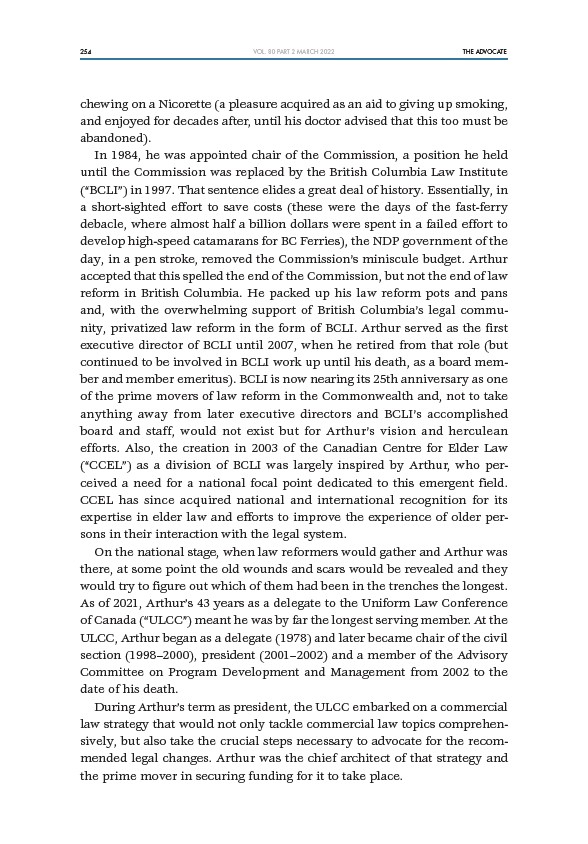
254 THE ADVOCATE
VOL. 80 PART 2 MARCH 2022
chewing on a Nicorette (a pleasure acquired as an aid to giving up smoking,
and enjoyed for decades after, until his doctor advised that this too must be
abandoned).
In 1984, he was appointed chair of the Commission, a position he held
until the Commission was replaced by the British Columbia Law Institute
(“BCLI”) in 1997. That sentence elides a great deal of history. Essentially, in
a short-sighted effort to save costs (these were the days of the fast-ferry
debacle, where almost half a billion dollars were spent in a failed effort to
develop high-speed catamarans for BC Ferries), the NDP government of the
day, in a pen stroke, removed the Commission’s miniscule budget. Arthur
accepted that this spelled the end of the Commission, but not the end of law
reform in British Columbia. He packed up his law reform pots and pans
and, with the overwhelming support of British Columbia’s legal community,
privatized law reform in the form of BCLI. Arthur served as the first
executive director of BCLI until 2007, when he retired from that role (but
continued to be involved in BCLI work up until his death, as a board member
and member emeritus). BCLI is now nearing its 25th anniversary as one
of the prime movers of law reform in the Commonwealth and, not to take
anything away from later executive directors and BCLI’s accomplished
board and staff, would not exist but for Arthur’s vision and herculean
efforts. Also, the creation in 2003 of the Canadian Centre for Elder Law
(“CCEL”) as a division of BCLI was largely inspired by Arthur, who perceived
a need for a national focal point dedicated to this emergent field.
CCEL has since acquired national and international recognition for its
expertise in elder law and efforts to improve the experience of older persons
in their interaction with the legal system.
On the national stage, when law reformers would gather and Arthur was
there, at some point the old wounds and scars would be revealed and they
would try to figure out which of them had been in the trenches the longest.
As of 2021, Arthur’s 43 years as a delegate to the Uniform Law Conference
of Canada (“ULCC”) meant he was by far the longest serving member. At the
ULCC, Arthur began as a delegate (1978) and later became chair of the civil
section (1998–2000), president (2001–2002) and a member of the Advisory
Committee on Program Development and Management from 2002 to the
date of his death.
During Arthur’s term as president, the ULCC embarked on a commercial
law strategy that would not only tackle commercial law topics comprehensively,
but also take the crucial steps necessary to advocate for the recommended
legal changes. Arthur was the chief architect of that strategy and
the prime mover in securing funding for it to take place.